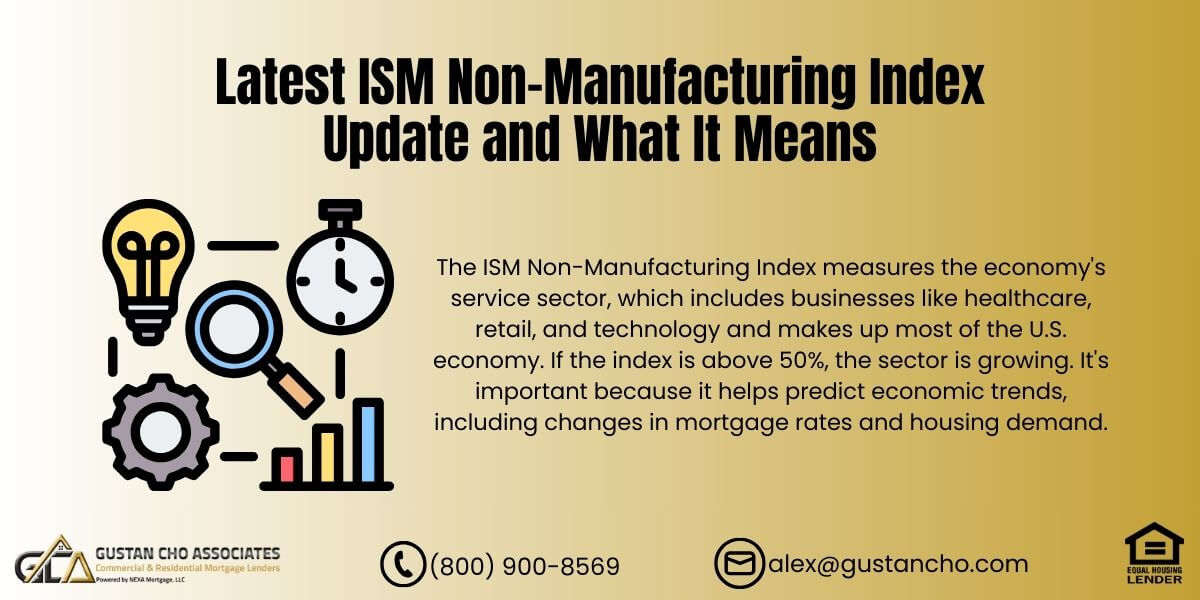Breaking News: The Implications of the ISM Non-Manufacturing Index for the Economy and Housing Sector in 2024.
The ISM Non-Manufacturing Index is more than just a number—it’s a key indicator of economic health, especially in the service sector, which includes industries like healthcare, retail, and technology. Understanding this index can provide valuable insight into whether it’s the right time for anyone considering buying a home to make such a significant financial decision.
This article will explain the latest updates about the ISM Non-Manufacturing Index, what the data means for the economy, and how it impacts the housing market. Whether you’re a first-time homebuyer or looking to refinance, we’ll break it down in simple terms so you can make an informed decision.
What is the ISM Non-Manufacturing Index?
The ISM Non-Manufacturing Index measures the performance of the service sector, which makes up over 75% of the U.S. economy. Each month, purchasing managers in non-manufacturing industries are being surveyed by the Institute for Supply Management. The survey looks at new orders, employment, and supplier deliveries.
The results are expressed as a percentage:
- Above 50%: The service sector is growing.
- Below 50%: The service sector is contracting.
For example, if the index reads 52.6%, the service sector is expanding but slower than expected.
Latest ISM Non-Manufacturing Index Update for 2024
In January 2024, the ISM Non-Manufacturing Index was reported at 54.1%, signaling moderate growth in the service sector. While this shows improvement from the lows of 2023, it’s still below the robust levels seen in previous years. The data reveals a mixed picture of the economy, with some areas showing resilience and others grappling with lingering challenges like inflation and labor shortages.
Here’s a breakdown of the key components:
- New Orders: Increased slightly to 56.2%, indicating growing demand.
- Employment: Dropped to 51.8%, reflecting hiring slowdowns.
- Prices: Rose to 62.5%, highlighting persistent inflation pressures.
Take First Step Toward Making Your Dream A Reality
Apply Now And Get recommendations From Loan Experts
What Does This Mean for the Economy?
The ISM Non-Manufacturing Index is a window into how businesses and consumers are feeling. When the index is growing but not meeting expectations, like the recent report, it suggests the economy is stable but not thriving.
Key Takeaways:
- Inflation Concerns Persist: Higher prices in the service sector could lead to higher living costs.
- Hiring Slowdowns: Lower employment numbers might signal cautious business behavior.
- Consumer Confidence: While not part of the ISM report, declining consumer confidence often accompanies lower-than-expected index readings.
How Does the ISM Non-Manufacturing Index Affect the Housing Market?
Mortgage Rates
The ISM Non-Manufacturing Index directly influences mortgage rates. When the index shows an economic slowdown, investors often turn to safer options like government bonds, which can drive mortgage rates down. However, inflationary pressures can offset this, causing rates to become volatile.
Home Prices
In 2024, the real estate market remains robust in many regions, as limited supply maintains elevated prices. However, some states, like Illinois, are seeing declines due to local economic challenges such as high property taxes.
Buyer Sentiment
A slowdown in the service sector might make some potential buyers cautious. On the other hand, lower mortgage rates could attract those eager to take advantage of reduced borrowing costs.
Should You Buy a Home in 2024?
The answer depends on your personal financial situation and goals. Here’s what to consider:
- Current Mortgage Rates: While rates have been volatile, they remain relatively affordable compared to historical averages. If you’re financially prepared, locking in a rate now might be a smart move.
- Your Local Market: Research your local housing market. Are prices rising or falling? Areas with declining prices, like parts of Illinois, may present opportunities for buyers.
- Your Financial Stability: Given that inflation remains a concern, confirm that you possess a reliable income and an acceptable debt-to-income (DTI) ratio before making a purchase.
Expert Insights: Fears of Recession in 2024
Economic experts remain divided on the possibility of a recession. According to Alex Carlucci of Gustan Cho Associates Mortgage Group:
The ISM Non-Manufacturing Index highlights how the service sector is holding up amidst challenges like inflation and global uncertainty. While fears of recession persist, the U.S. economy has shown remarkable resilience.
Carlucci also pointed out that the Federal Reserve’s monetary policies, including potential interest rate adjustments in 2024, will significantly shape the economy. Currently, no major rate cuts are expected, meaning mortgage rates may stay steady or fluctuate slightly.
Tips for Homebuyers in 2024
- Watch the Market Closely: Pay attention to updates on the ISM Non-Manufacturing Index and other economic indicators. These can provide hints about where mortgage rates and home prices might be headed.
- Get Pre-Approved: With market volatility, having a pre-approval in hand gives you a competitive edge. It also helps you understand what you can afford.
- Be Prepared for Volatility: Mortgage rates can change daily, so work with a lender who offers rate locks or flexibility.
- Consider Inflation-Proof Strategies: Inflation affects everything, including housing costs. Prioritize properties in areas with stable or growing economies.
What About Refinancing in 2024?
Refinancing could be a smart move if you already own a home, especially if rates dip below your current mortgage rate. Use tools like the ISM Non-Manufacturing Index to gauge economic trends and time your refinance for maximum savings.
What’s Next for the ISM Non-Manufacturing Index?
Economic forecasts suggest the index will hover around 54% to 55% for much of 2024. While this indicates moderate growth, external factors like global market conditions, geopolitical tensions, and Federal Reserve policies could cause fluctuations.
For those looking to purchase a home or those who already own one, being aware of these trends can assist you in making more informed financial choices. Knowledge is your best tool, whether you’re looking to buy, refinance, or simply understand how the economy impacts your mortgage.
Final Thoughts: Is It a Good Time to Buy a Home?
The ISM Non-Manufacturing Index gives us valuable clues about the economy’s health. While it shows moderate growth for 2024, inflation and hiring slowdowns are factors to watch. If you’re considering buying a home, focus on your financial readiness and the conditions in your local market.
At Gustan Cho Associates, we’re here to guide you through every step of the mortgage process. Reach out today to explore your options and see how we can help you achieve your homeownership goals in 2024.
Frequently Asked Questions About ISM Non-Manufacturing Index
Q: What is the ISM Non-Manufacturing Index, and Why is it Important?
A: The ISM Non-Manufacturing Index measures the economy’s service sector, which includes businesses like healthcare, retail, and technology and makes up most of the U.S. economy. If the index is above 50%, the sector is growing. It’s important because it helps predict economic trends, including changes in mortgage rates and housing demand.
Q: How Does the ISM Non-Manufacturing Index Affect Mortgage Rates?
A: Investors often turn to safer options like government bonds when the ISM Non-Manufacturing Index shows an economic slowdown. This can lower mortgage rates. However, if inflation is high, it may keep rates volatile. Staying updated on this index can help you decide when to lock in a mortgage rate.
Q: What Does the January 2024 ISM Non-Manufacturing Index Mean for Homebuyers?
A: The January 2024 index was 54.1%, showing moderate growth in the service sector. While this suggests stability, slower-than-expected growth might lead to volatile mortgage rates. If you’re financially ready, now could be a good time to buy, as rates are still affordable compared to historical averages.
Q: Can the ISM Non-Manufacturing Index Predict a Recession?
A: Not exactly, but a declining ISM Non-Manufacturing Index can signal a weaker economy. If the index falls below 50% for several months, it could indicate economic contraction, raising concerns about a potential recession. This information helps buyers decide whether to make large financial commitments like buying a home.
Q: How Does the ISM Non-Manufacturing Index Impact Housing Prices?
A: The ISM Non-Manufacturing Index indirectly affects housing prices. A slowdown in the service sector can lead to lower consumer confidence, reducing demand for homes. However, limited housing inventory in many areas keeps prices high, even with economic uncertainties.
Q: Is 2024 a Good Time to Buy a House Based on the ISM Non-Manufacturing Index?
A: It depends on your personal situation. With the index showing moderate growth and relatively affordable mortgage rates, 2024 could be a good year for buyers. Research your local market and consider your financial stability before deciding.
Q: Should I Wait for the ISM Non-Manufacturing Index to Improve Before Buying a House?
A: Not necessarily. While a higher ISM Non-Manufacturing Index indicates stronger economic growth, waiting might mean missing out on favorable mortgage rates. Focus on your financial readiness and consult a mortgage expert to determine the best time to buy.
Q: How Does Inflation in the ISM Non-Manufacturing Index Affect Homebuyers?
A: When the ISM Non-Manufacturing Index reports higher prices in the service sector, it reflects inflation pressures. Inflation can raise living costs, including mortgage rates, so homebuyers should plan for potential increases in monthly expenses.
Q: What Should First-Time Buyers Know About the ISM Non-Manufacturing Index?
A: First-time buyers should understand that the ISM Non-Manufacturing Index helps gauge economic conditions. A higher index often means better job stability and consumer confidence. In comparison, a lower index may indicate challenges like hiring slowdowns or inflation. Various elements can affect your capacity to obtain a mortgage or afford a house.
Q: Does the ISM Non-Manufacturing Index Only Affect the U.S. Housing Market?
A: Yes, primarily, but global economic factors tied to the index—like trade tensions or international demand for U.S. services—can also play a role. Understanding the ISM Non-Manufacturing Index can give you a clearer picture of the broader economic environment that impacts homeownership in the U.S.
This blog about “Latest ISM Non-Manufacturing Index Update and What It Means” was updated on November 21st, 2024.









